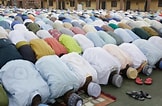Muslims across Nigeria observed a significantly scaled-down Eid-el-Fitr celebration this year as the biting economic situation forced many families to abandon traditional festivities in favor of more modest gatherings.
The celebration, which marks the end of the holy month of Ramadan, was characterized by low turnout at prayer grounds, reduced vehicular traffic, and minimal fanfare as Nigerians grapple with skyrocketing prices of food, fuel, and transportation.
In Zamfara State, our correspondent observed a markedly low attendance at prayer grounds, with the usual heavy traffic conspicuously absent. Many residents reported being unable to afford new clothes or prepare special meals for their families—traditions typically associated with the celebration.
Mainasara Mohammed, a resident of Gusau town, expressed his disappointment: “For the first time in my life, I could not buy new clothes for my family.” The practice of exchanging Sallah gifts, locally known as “goron Sallah,” also witnessed a significant decline, according to residents.
In Kaduna State, Senator Lawal Usman, representing Kaduna Central Senatorial District, urged Muslims to use the occasion for prayers regarding the country’s challenges. “I urge all Muslims to use this occasion to pray for peace, security, and prosperity in our country. We must come together to pray for an end to the challenges facing us as a nation,” Usman stated.
A Kaduna resident, Malam Abdullahi, noted the stark difference in celebrations compared to previous years: “Last year’s celebrations were more elaborate; this year, many Muslims have had to scale down their celebrations due to the economic challenges. However, we remain grateful to Allah for the blessings we have received.”
In Gombe State, Mohammed Deba, Chairman of the Coalition of Northern Groups, observed that the situation has remained largely unchanged since last year. “The level of poverty has remained unabated. However, many are getting used to the hardship already,” he remarked.
Borno State residents reported a calm atmosphere during the celebration, with improved security conditions but persistent economic challenges. Kida Abdulsalam, a Maiduguri resident, said: “Though we had a memorable Sallah celebration, you can’t compare it with previous years.” Another resident, Hassan Fatima, added: “In this period, who spends anyhow? They prioritise food and what children will wear.”
The situation in the South-West presented a mixed picture. In Osun State, major roads experienced unusually light traffic as many residents chose to stay home. Public transportation operators reported significantly reduced patronage.
Peter, a mini-bus operator in Osogbo, explained: “Many people preferred to stay at home and celebrate Eid with their loved ones instead of going around paying visits to people in far places. The cost of living and transportation is high and people don’t have that excess money to throw around.”
Contrary to the general trend, Oyo State Muslims reported enjoying a memorable celebration. Kunle Sanni, Chairman of the Muslim Community of Oyo State, credited this to community support and donations. “Politicians, especially our Senators and House of Representatives members, supported with food items. The Federal Government as well as rich Muslims also provided bags of rice and other food items which were distributed across the 33 local government areas of the state,” Sanni explained.
In Lagos, traders lamented poor sales during what is typically a profitable period. A clothing vendor at Yaba market identified as Chuks told our correspondent: “Even though this isn’t the big Sallah, the sales were just too low for those of us selling clothes. In time past, we made huge sales as families came shopping but this year we hardly had people who bought clothes.”
Meanwhile, the opposition Peoples Democratic Party (PDP) has blamed the ruling All Progressives Congress (APC) for the economic hardship affecting celebrations. In a statement, PDP National Publicity Secretary Debo Ologunagba said: “The PDP is deeply disturbed that while citizens of other countries are celebrating the Eid-el-Fitr in plenty, Nigerians are dampened in spirit due to the unbearable hardship occasioned by the misrule of the All Progressives Congress administration.”
Despite the economic challenges, religious leaders emphasized the values of compassion, kindness, and generosity during this period. Sheikh Abdulwahab Abdulkadir, an Islamic scholar in Kaduna, urged Muslims to “continue to uphold the values of compassion, kindness, and generosity” and to “strive to promote peace, understanding, and harmony in our communities.
Nigerians Mark Subdued Celebrations Amid Economic Hardship.
